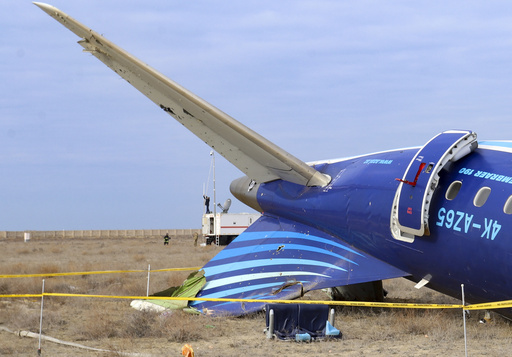Russian air defense systems may be responsible for the downing of an Azerbaijani airliner earlier this week, according to comments from a U.S. official and an Azerbaijani minister who suggested that the plane was struck by a weapon based on expert evaluations and testimonies from survivors.
On Friday, Rashan Nabiyev, Azerbaijan’s minister of digital development and transportation, and John Kirby, a White House national security spokesperson, supported claims from aviation analysts who attributed the crash to Russian defense systems reacting to a Ukrainian assault. This situation puts additional pressure on Russia, where officials mentioned a drone offensive occurring in the vicinity of the airport the flight was approaching, but they did not respond to the accusations concerning the air defense systems.
Kirby indicated to reporters that there are initial indications suggesting the aircraft might have been downed by Russian air defense systems, though he did not provide further specifics, noting that an investigation is still ongoing. When asked about whether U.S. intelligence led to this conclusion or if it was based solely on expert analysis, he confirmed the existence of intelligence but chose not to divulge more details.
The flight in question was traveling from Baku, Azerbaijan’s capital, to Grozny, the capital of Russia’s Chechen Republic, when it deviated toward Kazakhstan and crashed while attempting to land. The tragic incident resulted in the deaths of 38 individuals, while 29 survivors sustained injuries.
According to Nabiyev, preliminary assessments from experts indicate that there was external interference, a conclusion supported by witness statements. He noted that an investigation will determine the type of weapon involved in the incident.
Survivors recounted hearing loud noises on board the aircraft when it was in a holding pattern over Grozny. Flight attendant Aydan Rahimli described how the oxygen masks automatically deployed following a loud sound. She recounted assisting a colleague, Zulfugar Asadov, after they heard another loud bang. Asadov reported that the noises resembled something striking the plane and recounted suffering a severe arm injury suddenly, which he likened to being struck with an axe, dismissing claims from Kazakh officials about an oxygen canister explosion.
Other survivors, like Jerova Salihat, reported hearing explosions prior to the crash; she indicated in a hospital interview that an explosion occurred near her leg, while Vafa Shabanova stated, “there were two explosions in the sky, and an hour and a half later the plane crashed to the ground.”
Dmitry Yadrov, the head of Russia’s civil aviation authority, confirmed on Friday that as the plane approached Grozny in dense fog, Ukrainian drones were targeting the city, leading air traffic authorities to close the airspace. He added that after two failed landing attempts by the captain, the decision was made to reroute to Aktau, Kazakhstan, across the Caspian Sea. However, he refrained from commenting on expert observations suggesting that holes in the plane’s tail could indicate it was fired upon by Russian air defense systems.
In the past, Ukrainian drones have attacked Grozny and other regions in the North Caucasus of Russia. Following the incident, Azerbaijan Airlines attributed the crash to unidentified “physical and technical interference” and announced the suspension of flights to several Russian airports without specifying the source of this interference or providing additional information.
Kremlin spokesperson Dmitry Peskov chose not to comment on allegations that Russian air defenses hit the plane, emphasizing that it is the responsibility of investigators to determine the crash’s cause. He stated, “The air incident is being investigated, and we don’t believe we have the right to make any assessments until conclusions are drawn from the investigation.”
If it is confirmed that the crash was caused by Russian air defenses, it would mark the second deadly aviation incident linked to conflict in Ukraine, echoing the tragedy of Malaysia Airlines Flight 17, which was shot down over eastern Ukraine in 2014, resulting in 298 fatalities. Russia has denied involvement, yet a Dutch court in 2022 found two Russians and a pro-Russian Ukrainian guilty of their part in using a Russian surface-to-air missile to down the flight.
Azerbaijani investigators are currently conducting their inquiry in Grozny in response to Wednesday’s crash, as per a statement from Azerbaijan’s Prosecutor General’s office. Following the suspension of flights from Baku to Grozny and Makhachkala, Azerbaijan Airlines announced plans to halt services to eight additional Russian cities, while maintaining flights to six, including Moscow and St. Petersburg—locations which have also faced Ukrainian drone attacks previously.
Kazakhstan’s Qazaq Air indicated Friday that it would suspend flights from Astana to Yekaterinburg, Russia, for one month. Additionally, FlyDubai has ceased operations to Sochi and Mineralnye Vody for the next few days. On the previous day, Israeli carrier El Al also halted flights from Tel Aviv to Moscow, citing “developments in Russia’s airspace,” and noted that it would re-evaluate the situation in the following week.
